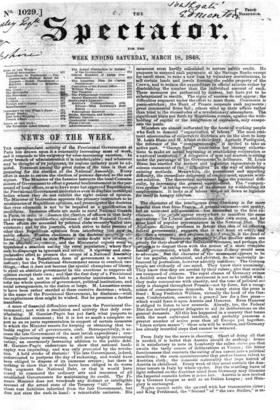The character of the intelligence from Germany is far more
hopeful than that from Francs. A geneettlealmness—not apathy, but an animated self-possession—has inicceeded to the first ex- citement. "; =IP ee-yle appear everywhere to manifest the same aspirations--for L.beral institutions in their own states, and for same kind of popular representation is the National Viet. The 111 ine Zeitunq professes to favvar that idea of an effectiv federal government; suggests that it will want an army, an the Aire a revenue; and ha, it the fund of t1 .e Zollverein. Suspicious pilvocxttflie smaller states are gfeecly for their sharertf-the FATIV"Venues, and perhaps the purposhis to disgust them with the notion of more complete federffUgoverninent, which the ANgemeine Zeigung would seem to advocate. But the character of the meveweat appears to be far too popular, subitantial, and elevated, to be• materially in- fluenced by journalism, however adroitly insidious. The German people are evidently of one mind. They know their unanimity. They know that they are needed by their rulers also that armies are composed of citizens. The royal classes of Germany evince a decided sense that the new movement is not to be trifled with : they make concessions with alacrity, and the tone of political Boa ciety is changed throughout Prussia—not by force, but a recog- nition of consentaneous demands. In many states the press is freed : King Frederick William, virtually the head of the Ger- man Confederation, assents to a general law for a free press— which would force it upon Austria and Hanover. Even Hanover is obliged to listen to new counsels. Already, too, the Federal Diet has invited popular delegates to aid'its deliberations on the general demands. All this has happened in a country that teems with the most cultivated intellect, and _probably possesses a greater number of active pens than all Europe put together. " Liters scripts menet ": • these acts will be written, and Germany has already recorded steps that cannot be retraced.


























